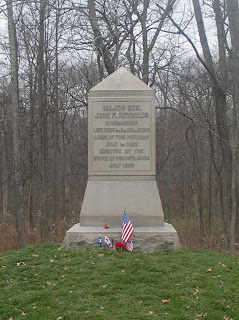One of the most
highly esteemed of all Union commanders, John F. Reynolds (1820-1863) fell on
the soil of his native state after a series of actions that helped save his
country. The Pennsylvanian West Pointer was serious, studious, quiet and a
talented artillery officer who first won distinction for bravery and leadership
in the Mexican War. During the interwar period, he served as both instructor
and commandant of cadets at his alma mater, earning praise also as a scholar
and administrator. Officers of such experience were rare, and he rose quickly
through the ranks, commanding a Pennsylvania
At the Union
calamity at Fredericksburg Lincoln Potomac Washington Lincoln Pennsylvania Gettysburg
Soon after the first contact,
Reynolds arrived on horseback with his advance guard. Conferring quickly with
cavalry commander General John Buford, Reynolds quickly grasped the seriousness
of the situation. Ordering his men to hold the high ground at all costs, he
dashed off a dispatch to Meade describing the situation and promising that if
necessary “we will barricade the streets of Gettysburg




No comments:
Post a Comment